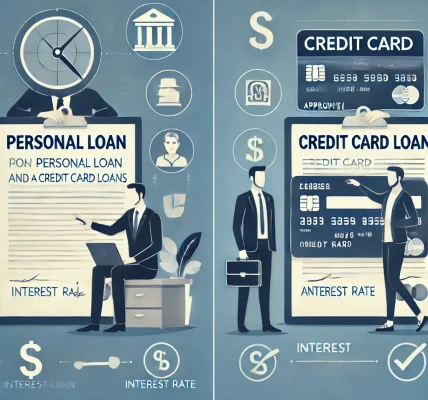Running a business requires capital, and whether you’re a startup, small business, or an established company, there are times when external funding is essential. Business loans help entrepreneurs cover operational costs, expand their business, and invest in new opportunities. However, choosing the right business loan can be overwhelming due to the wide variety of options available.
This guide will help you compare different types of business loans, their features, benefits, and how to choose the right one for your needs.
Types of Business Loans
Business loans come in various forms, each designed to suit different financial needs. Below are some of the most common business loans available.
1. Term Loans
A term loan is one of the most traditional financing options, where businesses borrow a lump sum of money and repay it over a fixed period with interest.
Best For: Established businesses needing capital for expansion, equipment purchases, or large expenses.
Key Features:
- Fixed repayment schedule (monthly, quarterly, or annually)
- Can be short-term (1–3 years) or long-term (5–25 years)
- Interest rates vary based on credit score and loan amount
Pros: ✔ Predictable repayment structure
✔ Higher loan amounts available
✔ Can improve business credit if paid on time
Cons: ✖ Requires strong credit history
✖ May require collateral
2. SBA Loans (Small Business Administration Loans)
SBA loans are government-backed loans that offer favorable terms to small businesses that may not qualify for traditional loans.
Best For: Small businesses needing long-term, low-interest funding.
Key Features:
- Loan amounts up to $5 million
- Lower interest rates than traditional loans
- Longer repayment terms (up to 25 years)
Pros: ✔ Low interest rates
✔ Favorable terms for small businesses
✔ Backed by the government, reducing lender risk
Cons: ✖ Lengthy approval process
✖ Requires extensive documentation
✖ Some businesses may not qualify
3. Business Line of Credit
A business line of credit is a flexible financing option that allows businesses to borrow up to a set limit and repay only what they use, similar to a credit card.
Best For: Businesses needing ongoing access to funds for working capital or unexpected expenses.
Key Features:
- Borrow as needed within the credit limit
- Interest is only charged on the amount used
- Can be secured or unsecured
Pros: ✔ Flexible borrowing and repayment
✔ Helps manage cash flow fluctuations
✔ Can be used for any business expense
Cons: ✖ Higher interest rates than traditional loans
✖ Requires a strong credit score for good terms
4. Equipment Financing
This loan is specifically designed for businesses that need to purchase machinery, vehicles, or other equipment.
Best For: Businesses that need to purchase or upgrade equipment without depleting cash reserves.
Key Features:
- Equipment itself serves as collateral
- Fixed interest rates and predictable payments
- Repayment terms based on equipment lifespan
Pros: ✔ Easier approval process since collateral is built-in
✔ Helps preserve working capital
✔ Can improve business efficiency with new equipment
Cons: ✖ Limited use (only for equipment purchases)
✖ Equipment may depreciate before the loan is fully repaid
5. Invoice Financing (Accounts Receivable Financing)
Invoice financing allows businesses to borrow against unpaid invoices to improve cash flow.
Best For: Businesses with outstanding invoices that need immediate cash flow.
Key Features:
- Advance typically 80-90% of invoice value
- Repayment occurs when customers pay invoices
- Fees are charged as a percentage of invoice value
Pros: ✔ Quick access to funds
✔ No collateral required (except invoices)
✔ Helps businesses with long customer payment cycles
Cons: ✖ Higher fees compared to traditional loans
✖ Customers’ creditworthiness impacts approval
Comparison of Business Loan Options
| Loan Type | Best For | Loan Amount | Repayment Term | Interest Rate |
|---|---|---|---|---|
| Term Loan | Expansion, large expenses | Varies | 1-25 years | Competitive |
| SBA Loan | Small businesses | Up to $5 million | Up to 25 years | Lower than traditional loans |
| Business Line of Credit | Working capital | Varies | Ongoing | Higher than traditional loans |
| Equipment Financing | Buying equipment | Varies | Based on equipment lifespan | Fixed |
| Invoice Financing | Cash flow needs | Up to 90% of invoice | Until invoices are paid | Varies (higher fees) |
How to Choose the Right Business Loan
When deciding on the best loan for your business, consider the following factors:
- Purpose of the Loan – Identify what the funds will be used for (growth, cash flow, equipment, etc.).
- Loan Amount Needed – Ensure the loan amount aligns with your business requirements.
- Repayment Ability – Choose a loan with repayment terms that fit your financial situation.
- Interest Rates & Fees – Compare rates to find the most cost-effective option.
- Creditworthiness – A strong credit score will help secure better terms.
- Loan Approval Time – If you need funds quickly, opt for loans with a faster approval process.
Final Thoughts: Which Business Loan Is Right for You?
There is no one-size-fits-all loan for every business. The best choice depends on your specific financial situation and business goals. Here’s a quick guide:
- For large investments or expansion: Go for a term loan.
- For low-interest, long-term funding: An SBA loan is ideal.
- For flexible, ongoing funding: Choose a business line of credit.
- For equipment purchases: Equipment financing is the best option.
- For cash flow gaps: Consider invoice financing.
By carefully evaluating your needs and understanding different loan options, you can make an informed decision that supports your business growth.




